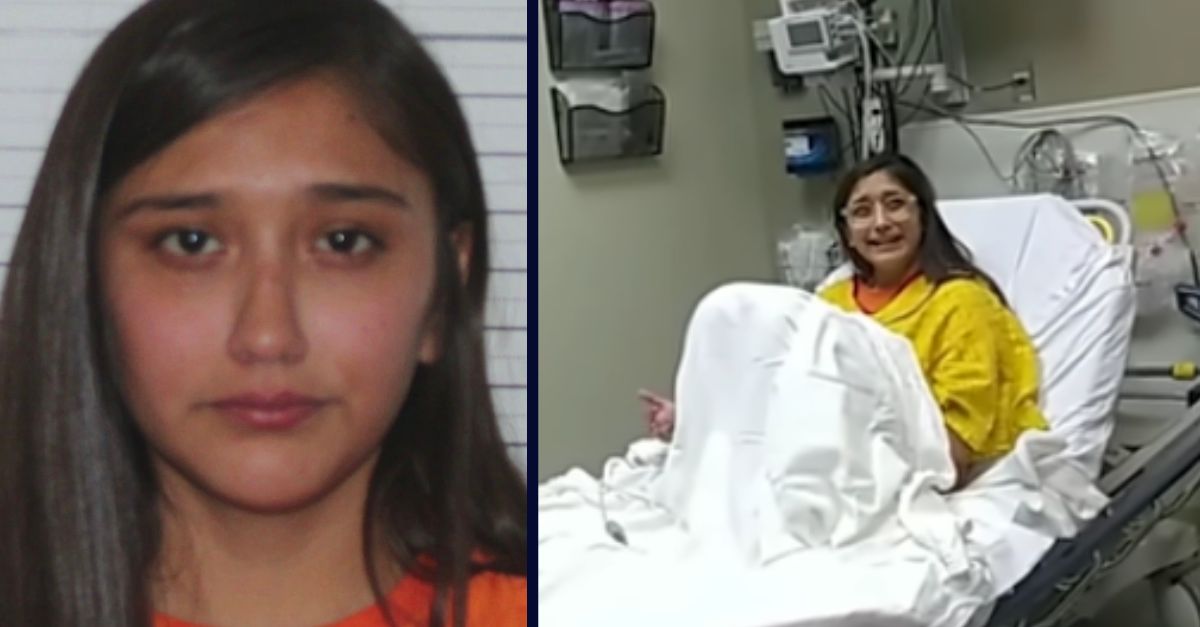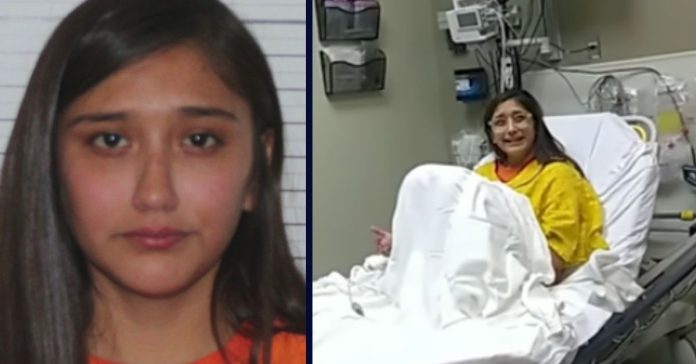
Left: Alexee Trevizo (Artesia Police Department); Right: Police body-worn camera footage of Trevizo in the hospital after giving birth (Law&Crime).
The state and lawyers for a woman accused of murdering her newborn baby boy in a hospital bathroom appeared before New Mexico”s Supreme Court on Thursday to argue their case about whether statements made by the defendant from her hospital bed are admissible.
Alexee Trevizo, now 21, was still a teenager when her child was found dead in a bathroom trash can by staff at Artesia General Hospital in January 2023. Law enforcement alleges the young woman killed the baby. The defendant, for her part, insists the child was stillborn.
After the baby was discovered, doctors called law enforcement. At least one police officer accompanied a doctor into the hospital room when she informed Trevizo and her mother about the situation.
Love true crime? Sign up for our newsletter, The Law&Crime Docket, to get the latest real-life crime stories delivered right to your inbox.
“I’m sorry, it came out of me and I didn’t know what to do,” Trevizo allegedly said, according to a transcript of the body camera footage.
Her mother urged Trevizo to tell the truth.
“I was scared … it was not crying or nothing,” Trevizo said.
Trevizo’s attorneys argued — and the district court agreed — that those statements should be suppressed because they were protected under doctor-patient privilege and the defendant’s rights were violated because she was not read her Miranda rights.
But the state is asking New Mexico’s high court to reverse that decision and reinstate those statements. Assistant Solicitor General Michael Thomas argued the lower court “erroneously” tossed the evidence.
“Many of the court’s key findings are either not supported by substantial evidence or even if they are, do not support any assertively related legal conclusion revealing that the district court was mistaken about the applicable law,” Thomas told the justices.
Justice C. Shannon Bacon chimed in and pressed Thomas about whether the police interaction with Trevizo should be considered an interrogation. Thomas said it was not a formal interview, noting that the officers did not say anything and Trevizo made the statements spontaneously.
Bacon expressed concern that the police had a “body of knowledge” of the facts of the case and they may have been fishing for incriminating statements.
“And that’s what troubles me in this case,” she said.
Also at issue is whether Trevizo believed she was “in custody” and not free to leave at the time of her statements. Justices noted that there were two armed police officers, who at one point were posted at the door of Trevizo’s room as well as in the room itself, which may have indicated to her she was under police custody.
“Why did they feel like it was appropriate to go into the room with the doctor to discuss treatment?” Justice Briana H. Zamora asked.
Thomas said cops were not there to discuss the treatment, but rather to investigate what happened with the baby, as it was clear Trevizo was the one in the bathroom when the boy was born.
Justices seemed skeptical.
“Watching her get a pelvic exam? Is that investigation?” quizzed Justice Michael E. Vigil.
Thomas argued the police were not hindering Trevizo from receiving care and were “very polite” and deferential to the doctor.
It was then Chief Justice David K. Thompson’s time to chime in.
“It appears that the state is taking a position that everything that the victim said is admissible because of the doctors’ requirement under statute to report that as a crime,” said Thompson. “And I’m struggling with that. I can see the doctor [statements being admissible], as she did say we have a deceased individual and I need to report that, but [allowing] the rest of it [in as evidence] seems, at that point, you’re just opening it up and all the privileges are just waived and whatever that defendant talked about is admissible.”
Defense attorney Amber Feyerberg argued that the justices’ decision goes beyond just this case.
“It’s the ramifications of this case that are extraordinary for Ms. Trevizo and for every vulnerable patient in New Mexico and for the state’s commitments to safe, confidential, reproductive healthcare,” Feyerberg said. “And even more importantly, to maintaining the line that separates medical care from police investigations. Physicians and medical personnel take on the role of caregiver. Police take on the role of investigator.”
Feyerberg said “vulnerable patients would be at risk” if the state were allowed to proceed with the case and use the statements.
No decision was made Thursday, and the justices said they would take the case under advisement.
As Law&Crime previously reported, Trevizo was originally arrested on charges of intentional abuse of a child, tampering with evidence, and murder in the first degree. Later, the criminal complaint dropped the lone child abuse charge against her.
In August 2023, Trevizo’s defense attorney was able to limit the evidence available to prosecutors.
So far, the defendant herself has only appeared in court once. That was the same day her attorney, Gary C. Mitchell, successfully argued for the suppression of several key pieces of evidence.
The suppression of that evidence reaches a great deal of what prosecutors likely would present to jurors during trial.
First, the defense argued at the time, the strong patient-physician privilege under New Mexico law prohibits the prosecution from using almost all of what happened at the hospital — except for the basic fact of staff reporting the dead infant that was discovered in the bathroom.
“The privilege applies from the time she went to the hospital, and it applies to everybody there,” Mitchell said in 2023. “Everything that takes place from the time she first went to the hospital. Everything the doctor and the nurses said. They could not give that out [to police] without a waiver from my client, and we didn’t waive it.”
Mitchell was clear that the suppression request was broad: “Anything that happens at Artesia hospital,” the defense attorney said.
In the end, Fifth Judicial District Judge Jane Shuler-Gray, sitting in Carlsbad, agreed with the defense on the medical privilege issue.
Second, Mitchell argued, his client was effectively detained by the hospital on behalf of law enforcement; in fact, a doctor at the hospital waited until two police officers had arrived to ask Trevizo about what happened in the bathroom. This, the defense attorney claimed, was a violation of the woman’s Miranda rights under the Fourth Amendment.
The court agreed with that defense argument, too.
“It was just wrong,” Mitchell has told Albuquerque-based ABC affiliate KOAT. “I mean, all of us want to protect or should want to wish to protect, our medical history. It’s not something we want broadcast to the rest of the state and hers was broadcasted not just to the rest of the state, but the rest of the world.”
“I think without that evidence, they don’t have a case because they’re not entitled under the present decision of the trial court to utilize those medical records or to utilize any statements that she may have made,” Mitchell also told the station.
Body-worn camera video of the Jan. 27, 2023, incident quickly went viral, showing police and doctors speaking with then-19-year-old Trevizo after the baby was found. Additionally, footage from the hospital’s own hallway surveillance cameras was leaked to the media.
In early July 2024, District Attorney Dianna Luce, who represents three counties — Eddy, Lea, and Chaves — asked the New Mexico Supreme Court to overturn the district court’s suppression ruling.
The precise arguments advanced in the state’s brief are unknown.
A spokesperson for the district attorney’s office told Law&Crime the appeal “is sealed by the court and cannot be shared in accordance” with a state law generally limiting public records requests.
Still, the upshot is clear enough.
While largely keeping mum, the prosecutor discussed her office’s appeal of Shuler-Gray’s ruling in comments to local media last month — broadly outlining the state’s arguments in comments to Albuquerque-based CBS/Fox affiliate KRQE.
“All I can say is that obviously it was evidence that we believe was proper, evidence that we believe that we should be allowed to use, and we respectfully disagree with the court,” Luce said.
During a summer 2023 hearing, the state did not contest the strength of the patient-doctor privilege, but said that the privilege did not apply.
“The defendant’s mother is present in the room with her at the emergency room,” Luce unsuccessfully argued before the court. “You can’t have a privilege if you have a third party present. So, statements that are made are not going to be privileged under this rule.”
Trevizo is also suing the hospital for the child’s wrongful death. Mitchell has argued that hospital staff improperly administered a series of medications with contraindications for pregnancy — even after his client’s test results showed she was pregnant.
The baby boy was born and died on Jan. 27, 2023. On March 28, 2023, an autopsy determined his death was a homicide; the defense subsequently contested the state’s examination process as “medieval.” On May 10, 2023, Trevizo was charged, then arrested the next day. She was released five days later and is currently out on bail.
Colin Kalmbacher contributed to this report

